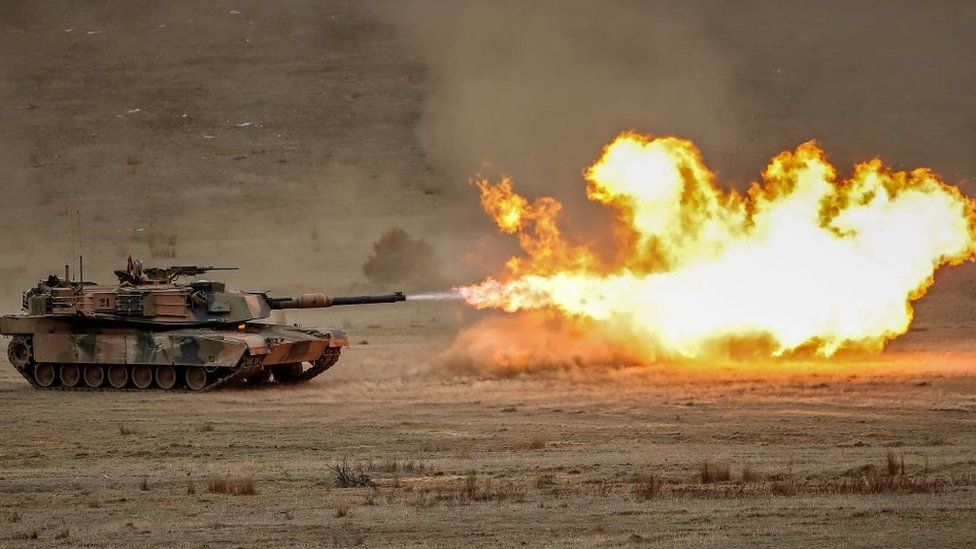The US has announced it will supply depleted uranium tank shells to Ukraine as part of more than $1bn (£800m) in military and humanitarian aid.
Russia condemned the move to equip US Abrams tanks with the controversial armour-piercing munitions.
The announcement came as Ukraine accused Russia of killing 17 people in a missile attack on a market street.
Overnight, suspected Ukrainian drone attacks were reported on the Russian city of Rostov-on-Don and near Moscow.
Unconfirmed video showed what appeared to be a blast in central Rostov where, according to Governor Vasily Golubev, one person was lightly injured and several cars were damaged.
He said that two drones had targeted the city – situated in the south of Russia – and both had been shot down.
Moscow Mayor Sergei Sobyanin said a drone that targeted the town of Ramenskoye had also been shot down and no damage had been reported.
The Russian reports could not be verified independently.
- What are depleted uranium shells and are they harmful?
The announcement of a new security package for Ukraine came during top US diplomat Antony Blinken’s visit to Kyiv.
The 120mm uranium tank rounds – included in $175 million of US military equipment for Ukraine – are for M1 Abrams tanks due to be delivered to Ukraine later this year.
Depleted uranium is naturally occurring uranium which has been stripped of much – but not all – of its radioactive matter.
Uranium is a very dense metal, so depleted uranium can be used to reinforce the armour-plating on tanks. It can also be put on the tips of bullets, mortar rounds and tank shells, to penetrate conventional tank armour.
Depleted uranium shells sharpen on impact, which further increases their ability to bore through armour, and they ignite after contact.
The UN Scientific Committee on the Effects of Atomic Radiation has found no significant poisoning is caused by exposure to depleted uranium but another UN body, the International Atomic Energy Agency, says there could be a risk of radiation to individuals who handle fragments of depleted uranium rounds.

In March, a spokesman for the Pentagon said the US would not be sending any munitions with depleted uranium to Ukraine. The comments were made after the UK said it would provide Kyiv with the armour-piercing rounds.
The US will also provide anti-armour systems, tactical air navigation systems and additional ammunition for Himars missiles.
“This new assistance will help sustain it and build further momentum,” Mr Blinken said.
The Russian embassy in Washington denounced the decision as “an indicator of inhumanity”, adding that the US was “deluding itself by refusing to accept the failure of the Ukrainian military’s so-called counter-offensive”.
Since June, Ukraine’s territorial gains in the counter-offensive have been very small, but Ukrainian generals claim they have breached Russia’s formidable first line of defences in the south.
On Wednesday, 17 people, including a child, were killed in an attack on the city of Kostyantynivka, in Ukraine’s eastern Donetsk region.
Ukrainian President Volodymyr Zelensky blamed Moscow for the attack but Russia is yet to comment.
This video can not be played
